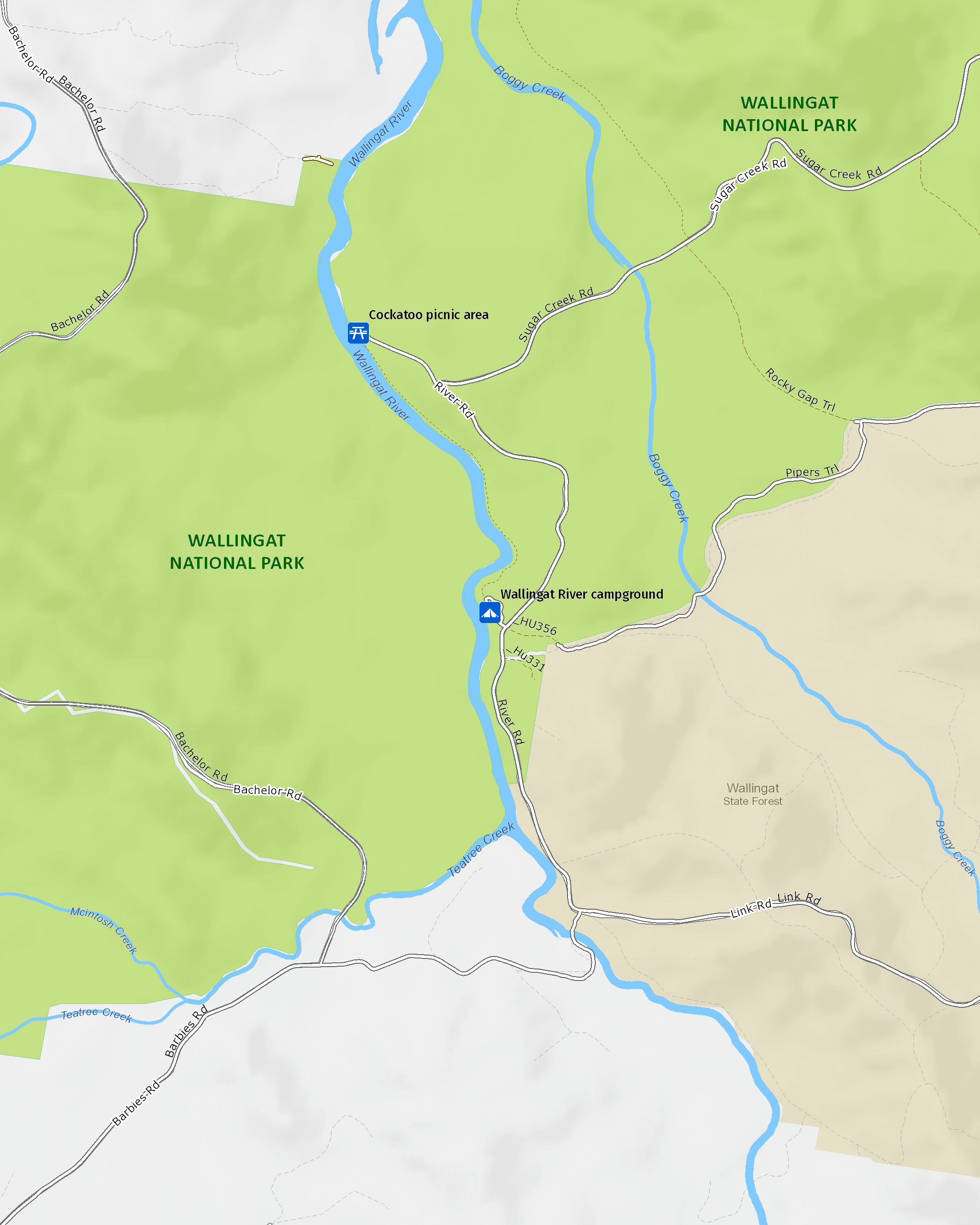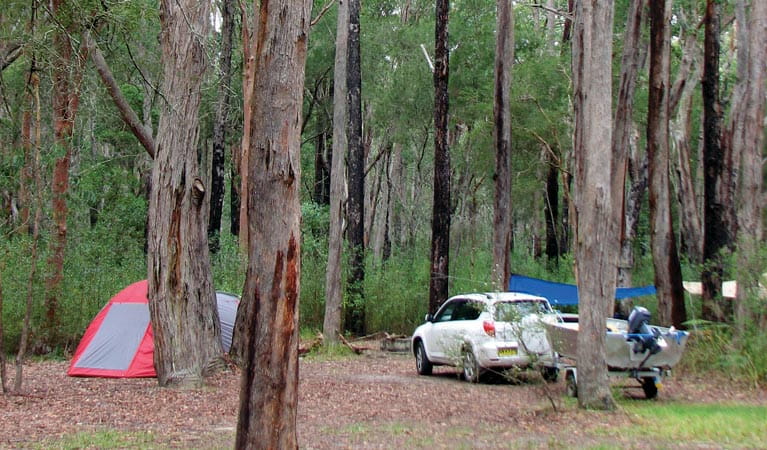Wallingat River campground
Wallingat National Park
Overview
With its tall timber and river outlook, Wallingat River campground offers a peaceful, beautiful place to camp and enjoy swimming, easy walks and birdwatching.
| Number of campsites | 20 |
|---|---|
| Camping type | Tent, Don't mind a short walk to tent |
| Facilities | Picnic tables, barbecue facilities, toilets |
| What to bring | Drinking water, cooking water, firewood |
| Price | |
| Group bookings | Book up to 20 people or 5 sites online. For larger groups, make a group booking enquiry. |
| Please note |
|
If you’re after a place to camp that’s incredibly quiet, Wallingat River campground may be just what you’re looking for. Perched on the riverbank beneath towering eucalypts, it’s remote enough to mean you can revel in the peace and quiet. Spend your days walking through the nearby cabbage palm and rainforest stands, fishing or swimming in Wallingat River, or soaking up the natural world surrounding you. The cockatoos sing up a storm, and wallabies and possums live nearby. You’re mostly likely to see them either at dawn or dusk.
Active types might want to put the mountain bike in the car because the trails around Wallingat National Park make for great riding. Or bring your kayak for paddling along the river. There’s so much to do, it’s a shame to leave.
Map

Map legend

Local alerts
For the latest updates on fires, closures and other alerts in this area, see https://www.nationalparks.nsw.gov.au/camping-and-accommodation/campgrounds/wallingat-river-campground/local-alerts
Bookings
- National Parks Contact Centre
- 7am to 7pm daily
- 1300 072 757 (13000 PARKS) for the cost of a local call within Australia excluding mobiles
- parks.info@environment.nsw.gov.au
Operated by
- Booti Booti Office
- Monday to Friday, 8.30am to 4.30pm. Closed public holidays.
- 02 6591 0300
- npws.manninggreatlakes@environment.nsw.gov.au
- The Ruins campground, Booti Booti National Park, 4374 The Lakes Way, Booti Booti 2428
Park info
- in Wallingat National Park in the North Coast region
Wallingat National Park is always open but may have to close at times due to extreme weather or fire danger.
Visitor info
All the practical information you need to know about Wallingat River campground.
Getting there and parking
Wallingat River campground is in Wallingat National Park. To get there from Forster:
- Travel 30km south along Lakes Way
- This will take you to Sugar Creek Road
- Stop at Gur-um-bee picnic area to check the information board
Road quality
- Unsealed roads
Vehicle access
- 2WD vehicles
Weather restrictions
- Dry weather only
Parking
Parking is available at Wallingat River campground.
Best times to visit
There are lots of great things waiting for you in Wallingat National Park. Here are some of the highlights.
Autumn
With temperatures slightly cooler, explore the network of gravel roads by foot or on a mountain bike.
Spring
With the wildflowers - including the purple blooms of the velvet mint-bush - coming out, this is a great time for birdwatching.
Summer
The weather is warm and sunny, so now's the time to pitch a tent and stay for a few days. Make the most of the boat ramp at Cockatoo picnic area Head to Sugar Creek picnic area and, after lunch, take a walk through the cool forest. .
Winter
Visitor numbers are down, so take the car along the park's unsealed roads and discover the forest, rivers and lake.
Weather, temperature and rainfall
Summer temperature
Average
20°C and 29°C
Highest recorded
45.2°C
Winter temperature
Average
7°C and 21°C
Lowest recorded
-5°C
Rainfall
Wettest month
March
Driest month
Sept
The area’s highest recorded rainfall in one day
280.2mm
Facilities
- Water is not available at this campground.
- Firewood is not provided and may not be collected from the park. Please don’t leave your fireplace unattended and please ensure any fires are fully extinguished when you leave.
- Bins are not provided, so please take your rubbish with you.
Toilets
- Non-flush toilets
Picnic tables
Barbecue facilities
- Wood barbecues (bring your own firewood)
Maps and downloads
Prohibited
Pets
Pets and domestic animals (other than certified assistance animals) are not permitted. Find out which regional parks allow dog walking and see the pets in parks policy for more information.
Smoking
NSW national parks are no smoking areas.
Learn more
Wallingat River campground is in Wallingat National Park. Here are just some of the reasons why this park is special:
Ancient footprints

The 6,557ha of Wallingat National Park is part of the identity and spirituality, as well as a resource, for people of the Worimi nation. The Worimi People lived a traditional hunter-gatherer lifestyle and used the leaves of the cabbage palm for weaving baskets and its fibrous bark for making fishing line. They used many of the area's natural resources, including the freshwater lakes, stone outcrops, and the ocean. A central campsite was known to exist in the area now known as Coomba Park, although there are few other Aboriginal sites recorded within the park include the Bungwahl area.
Fun times

Whether you're after a relaxing time or something more adventurous, Wallingat is just the spot. Take to the gravel roads either on foot, in a car or on a bike – to explore the forests. You can swim, fish and paddle on Wallingat River. Pitch a tent in the campground and get away from it all for a few days in this naturally beautiful setting. Surrounding some of the picnic areas and campsites, you’ll find magnificent stands of trees. In the southeast corner of Wallingat, there are tall, straight flooded gums, as well as stands of cabbage palms. Find both during a walk from Sugar Creek picnic area. Some rare plants such as the liana woody climber, a climbing species that bears white flowers from August to May, can also be found here.
- Double Wharf trail Experience the scenic waterways and mountainous forests of Wallingat National Park along Double Wharf trail – perfect for walking or mountain bike riding.
- Wallingat Forest drive The 25km loop of Wallingat Forest drive, near Forster, is on unsealed roads that meander through forests, and excellent for cars, 4WDs, bicycles, walking and horse riding.
- Whoota Whoota lookout From Whoota Whoota lookout, easily accessible by car, you can see for miles. Take in scenic views of Wallingat’s eucalypt forests, Wallis Lake and 100km of coastline.
Life among the trees

More than 200 species of birds make Wallingat National Park a home. Walking through forest as well as stands of straight flooded gums, and cabbage palms, you'll hear birds singing. Noisy friarbirds, for instance, have a distinctive 'ya-kob' call, while a 'woop, woop, woop' sound signals the presence of the wonga pigeon. You might see blue wrens flitting through the trees, as well as king parrots and glossy black cockatoos. Wallingat is also a popular spot for the satin bowerbird – the males are black and shiny, the females are a plainer brown. They both, however, have startling lilac eyes.
- Double Wharf trail Experience the scenic waterways and mountainous forests of Wallingat National Park along Double Wharf trail – perfect for walking or mountain bike riding.
- Sugar Creek picnic area Sugar Creek picnic area is a family-friendly relaxation spot with easy walking trails through forested landscape, a leisurely drive from Forster and Pacific Palms.

